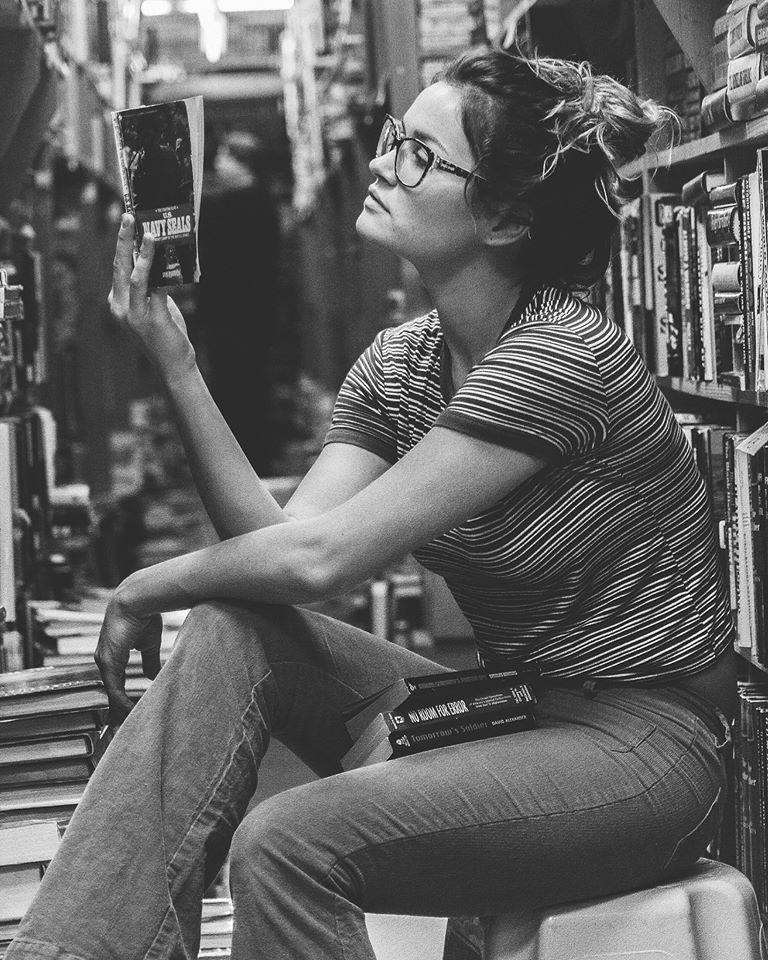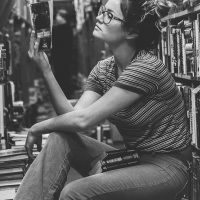
One of the most frequent questions I’m asked as a woman is whether I have a boyfriend.
Whether it’s at holiday family dinners, work meetings, or among friends on a night out.
The question of a possible girlfriend, or the all-inclusive term “partner,” never comes up.
How often do strangers assume that I’m straight because I wear makeup and jewelry? And that I just need to find a strong, young man to be fixed up with and produce offspring with to be complete?
How many times have I been told, “But you’re so pretty!” in response to my sexual orientation or relationship status…as if beauty is wasted on the queer.
Jacksonville is a small, big town in Florida, where the standards of success are very traditional. With one gay bar—RIP Bo’s—now closed down, and the general atmosphere of the beach area being predominantly white, and predominantly heterosexual, I didn’t grow up allowing myself to imagine anything else.
In my town, you were surrounded by the dream: date, go to college or study a trade, maintain long-term relationship, graduate, find work in career path, move in with a significant other, get a dog, get married, buy a house, have children, be happy. It was the same picture of perfection I saw in Hallmark movies, in theaters, even in television ads.
But I wasn’t sold.
My first few experiences with pushing those sexual limitations varied over the years: smoking joints and exhaling into a friend’s mouth, kissing for a dare at a party, playing suck and blow, drunken make out sessions, the list goes on.
There were doubts and thoughts bouncing around my mind, but none seemed pointed at the obvious. It just wasn’t something I considered possible—and I had no role models to tell me otherwise. My entire family was straight and mostly married. I’d been told I was going to be a “heartbreaker” to the boys in school since I was a child, and asked constantly as a teen whether there were any young men I was dating.
The expectations had been made clear, and I was meant to follow through.
It wasn’t until I was 23, my birthday night, when a close friend of mine came onto me. In my beyond drunken state, I gave no regard to what was actually happening as we began kissing in a public bar’s bathroom stall. We were just having fun, I convinced myself. It was no big deal. It was just like the other times.
It wasn’t until another friend walked in on us that reality slapped me across the face. I soon after burst into tears, watching her shocked face and quick turn as she slammed the bathroom door and shunted off—what was I thinking?
And more importantly, at the time, what would everyone else think? My birthdays were always something to remember—but this one would be unforgettable.
After that night, and for the rest of the year, I swept that mishap so far under the rug, it felt more like something I had invented rather than something that had actually transpired between us. The girl and I, to my shame, drifted apart—purposefully on my end—as rumors circulated about us in my friend group and at the restaurant where we both worked.
I was embarrassed and, like the feeling before you get sick, couldn’t stop trying to shove everything down, make my excuses, and lie it all away. Nothing happened. It was nothing. I was drunk.
They were practiced tales—and they worked. I could live with the shame, as long as I was still straight. My boyfriend at the time even begged me to take him back, if I would just apologize and pretend that it hadn’t happened. I agreed, and just like that, it was behind us. The year went on, and then the month before my 24th birthday, everything changed again.
Life is crazy that way—and I was learning that I needed to forget about everyone else and take a long, hard look at the persona I was hiding behind.
My first girlfriend came into my life like a sharp, intoxicating inhale and left just as roughly. She opened my horizons, made me feel things I hadn’t felt in years, sprung me from a depression that had been forming, and instilled passion and fire within me again. I was feeling revived, new, different.
I was writing constantly, journaling, and storytelling—exploring myself with this new realization: that I didn’t have to be everything I had been told I was.
I questioned everything—and was glad to. But I was not prepared for the welcoming committee in my small hometown with small-minded people.
Upon hearing that I was dating a girl, I was told:
By an older guy from my high school, “What’d we do wrong, Taylor? I can do better!”
By a stranger at a bar, “I promise, I’m man enough for you.”
By my own blood, “You’ll grow out of it. I know that you’re more attracted to guys.”
By a family friend since I was eight, “I know you’re going to miss what a man can give you. This won’t last forever!”
By my parents, “But don’t you want children?”
The comments continued as our relationship did, and pierced my sensitive, vulnerable heart. There was a great sigh of relief when it ended, from her and I to the rest of my loved ones, but I was adamant about where I stood on the spectrum. This wasn’t a phase—it was a wake-up call.
And then a more disturbing realization as we ended, and I entered the limbo of what would happen next: not only did I receive judgement from the hetero community, the gay community had their two cents to put in as well. From my ex, “You’re probably going to go back to a guy and get married. That’s what all the girls I date do.”
Even though I had dated her for a year and some months, my experience wasn’t enough. I wasn’t gay enough. I wasn’t a lesbian. As I talked to another girl about liking women and men: “You don’t count; you’ve only dated one girl.”
Because I was denied my own perspective on how I felt toward others, and my sexual identity, I began experiencing the need to prove myself. I needed to do more, to talk about my sexual experiences with anyone who was gay or straight to be accepted as the person I already knew myself to be.
Even while dating my boyfriend after my girl ex, I made out with friends I didn’t find myself necessarily attracted to, putting myself in situations I wasn’t comfortable with, but felt I needed to add to my sexual experience register. I became numbingly okay with hookup culture after my boyfriend and I broke up. I ignored the gnawing feeling inside that knew it wasn’t what I wanted or needed from the interactions I received.
After leaving Barcelona, I moved to Napa, where my mom has now lived for two years. Napa was the fresh air and identity reassessment that I craved. A friend of mine, Squirrel, lived only an hour away and I was so happy to be living in both wine country and an hour from the Queer Mecca. This would usher in a new chapter of life, and I was ready.
One of the first things I noticed in visiting San Francisco is that there are no assumptions. Not by myself, or others. The culture is so diverse in the city that rather than assume, people openly ask for the information rather than predicting someone’s preferences or background based on cultural norms or stereotypes.
“Do you like men or women, or both?” “Are you dating anyone?” “Do you have a girlfriend or boyfriend?” “What are your pronouns?”
It was refreshing, and so opposite from my coming out and the beginning of my experience as “queer” in Florida. I wasn’t afraid of not being enough—I had nothing to prove in a city of people that wore their sexuality as if it were another limb, a part of them that just was. I understood now why the queer community was so immense in San Francisco. The confidence that exuded from every person drew me in like a moth to a lamplight.
No wonder we were drawn here—you could just be.
Over the next year, I began learning the art of undoing. I didn’t need to mention my preferences when first meeting someone.
Our sexuality should be as normal as the clothes we choose to wear or the car we drive. It’s just what we like. No explanation needed.
I shed the shame and need for approval from others and fell into step with comfort and confidence. They would find out on their own—and whatever they thought of me after was none of my business.
I read somewhere that coming out isn’t a one time thing—it’s something that you continuously experience.
Each person has a certain view of you, and your interactions with one another constantly change that. But we are intelligent beings and have always learned to adapt to new ideas and ways of being.
And that has been true from 2017 to now. What I didn’t understand until this past year was that I didn’t need to feel so strongly or overthink what would happen after someone learned about that aspect of myself.
We all make judgments, and we’re all capable of redirecting our perception of others, practicing empathy, and learning to understand the differences that exist in each person, and gracefully accept them.
I like men and women, and I’m finally okay with that.
Coming out is a lifelong battle, and it’s one that I won’t ever stop fighting.
~











Read 1 comment and reply